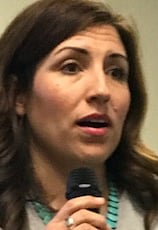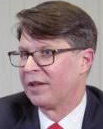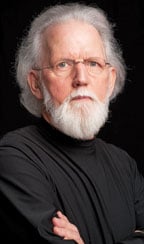Seattle council member elected with Democracy Voucher funds briefed Austin residents and Charter Review Commission
Updated Friday February 23, 2018 12:24pm to add late breaking news at bottom
Updated Wednesday May 9, 2018 9:51am (Charter Review Commission–not Charter Revision Commission)

“Hi, I’m Teresa and I’m running for City Council as Democracy Voucher candidate. Would you be willing to sign right here?”
They would say, “Sure.”
Then I would say, “Would you give me $10?”
“It was a little awkward,” she told members of the 2018 Charter Review Commission who met in the community room at the Mueller HEB grocery store Monday, February 19, 2018.
That’s how Seattle Council Member Teresa Mosqueda described her first-ever attempt to run for public office in 2017. She said she inserted herself into public marches and walked backwards to talk to people while soliciting support, getting signatures on her petition, and asking for contributions.
At the time she was running, Seattle was having frequent marches, with lots of people in the streets around the time Donald Trump was nominated as the GOP presidential candidate, “marches for women’s rights, human rights, and I was out there walking backwards,” she said.
Mosqueda’s presentation to the Commission was an encore for a longer talk she gave to a larger audience at the Manchaca Branch Library Sunday, February 18, 2018. That presentation, which included the entire slide show (linked at the bottom of this story) lasted nearly an hour and a half, including time to answer questions.
As a 36-year-old Latina and labor activist, Mosqueda said she was virtually unknown to Seattle’s population of 705,000 people. More than 500,000 of them were registered voters, and each had received four $25 Democracy Vouchers in the mail in early January 2017.
How Democracy Vouchers worked
To qualify to accept Democracy Vouchers as contributions that could be used for campaigns, Seattle candidates running for the two at-large Council seats and the City Attorney’s job needed to collect at least 400 signatures with a minimum $10 donation from each signer. That was the threshold Seattle set to avoid wasting taxpayers’ money by weeding out would-be candidates who could not demonstrate enough community support to run a viable campaign.
In addition to accepting vouchers, qualifying candidates agreed to accept individual contributions of no more than $250. Candidates who chose not to participate in the voucher program were able to accept contributions of up to $500. As it is everywhere in this country, there is no limit on how much the candidates could personally spend on their own campaigns.
The voucher program was budgeted for $3 million a year for 10 years and financed through property taxes that averaged $11.50 per household that year, she said.
Although the Seattle mayor’s job was on the 2017 ballot too, by design it was not made part of the voucher program used for the first time that year. That way, the new financing method could be tested to see how it worked. “We were flying a plane while designing it,” Mosqueda said.
Maps comparing where voucher donors to Mosqueda’s campaign lived, compared to where cash contributors to the mayor’s campaign lived, showed that her donors were from more geographically diverse parts of the city. That’s important because it showed far more participation by voucher donors.(See maps on page 12 of the slides, linked at the bottom of this story.)
The voucher system also drew greater participation by younger and low-income voters and people of color, she said. Those people were far less likely to participate under the old system requiring personal funds for donations.
“Eighty-one percent of my contributions came from vouchers,” she said. “I didn’t have big business funding my campaign. I was able to go door-to-door and say, ‘This is a grassroots campaign and I need your vouchers.’ ” She said she spent just $361 of her own money in the campaign.
Total contributions were capped at $150,000 for the primary and the same amount for the general election. But the voucher system also provided a safety valve of sorts by raising the cap if a candidate’s opponent was supported by independent expenditures. That happened in Mosqueda’s campaign and she was ultimately able to raise $458,000, she said.
Voucher holders had the option of giving vouchers directly to the candidate or marking them for candidates of their choice and mailing vouchers directly to the City’s Ethics and Election Commission. “Eighty percent of those I received went directly to the city, not to me,” Mosqueda said, “and a check was sent to me everyday. One day I got $40,000. So I wasn’t sitting in a room dialing for dollars.”
She won 61.2 percent of the votes against her runoff opponent, a straight white man who had been endorsed by both major newspapers in Seattle, who had started his campaign two months before Mosqueda, and who had better name recognition from his previous run for city council. He was also a Democracy Voucher candidate.
The next Seattle council election will be held in 2019 when only the seven council seats that represent geographic districts will be up for grabs.
What would Seattle do differently next time?
Some of the lessons learned in the shakedown effort in 2017, Mosqueda said, point to changes needed for future elections:
• Mail to everyone—Democracy Vouchers should be mailed to all households, not just to registered voters. The 2017 system allowed legal residents who were not registered to vote to request vouchers later, but that inhibited participating—especially in the anti-immigrant political climate brought about by Trump’s nomination. Mosqueda said she will propose mailing vouchers to everyone through utility billings to achieve that end.
• Mail vouchers later—Vouchers were mailed in early January and the primary election was not held until August. Some people misplaced the vouchers. Others said the vouchers had been collected by “someone from the city,” when no one but candidates were authorized to receive the vouchers.
• Enable online contributions—Given the familiarity with e-commerce most voters would have found it easier to donate money online rather than with checks or cash.
• Provide more outreach—Democracy Voucher materials were made available in 16 languages for the 2017 election cycle (see list here) but more public education about the voucher program is essential, especially for non-English speakers.
• Consider the cap—“The sad part was the cap at the end,” Mosqueda said. Because she reached it quickly, the vouchers given by people who wanted to support her campaign with vouchers and didn’t do so early were not usable. She called for a “massive education program” to make people aware of the cap.
• Enable limited bundling—Because only candidates or someone on campaign staff could collect vouchers, others were barred from helping. “It would be helpful if trusted organizations would be able to help bundle,” Mosqueda said. Bundling was barred in 2017 because of the concern that campaigns would pay people to collect vouchers. She said labor unions, church congregations, the Sierra Club and even Democratic Party organizations were not allowed to collect vouchers.
Ultimately, Mosqueda said, only 5 percent of the half-million vouchers distributed were turned in for use by participating candidates.
Commission debate and vote set for February 26
Mosqueda was invited to Austin to explain how Seattle’s system of public campaign financing worked because the Charter Review Commission has had several discussions about possibly recommending that a system modeled on it be put on the November ballot. Her expenses were shared by Common Cause Texas, Commission Member Fred Lewis, and Mosqueda personally, since she combined business with pleasure for the visit.
In deciding whether to recommend vouchers the Commission has three considerations, Mosqueda said, and it depends on what goal the vouchers are designed to accomplish. “Is the goal to get money out of politics, is it to get more people engaged in the process, or is to change who is contributing?”
In Seattle, “We saw a 300 percent increase in the number of individual contributions” because of vouchers. The average donation, which in 2015 was $209, dropped to $88 in her race.
The Commission is scheduled to consider a revised draft recommendation and vote on it at its Monday, February 26, meeting in Room 1029 at City Hall. The meeting starts at 6:30pm. The agenda has been posted and readers can check it by clicking here.


As reported by The Austin Bulldog, the Charter Review Commission was briefed on Seattle’s system January 8, 2018, by Wayne Barnett, executive director of the Seattle Ethics and Election Commission, which implemented the Democracy Voucher program, and Paul Seamus Ryan, the Common Cause national vice president for policy and litigation, who helped draft the Seattle measure.
“Wealthy people are well represented and always have been,” Ryan said at that meeting (no relation to House Speaker Paul Ryan). “Public financing creates incentives for people to participate,” including volunteering for campaigns and holding the winners accountable after the election.
The Charter Review Commission’s four-person campaign finance committee had already reviewed mutliple options for changing City Charter campaign finance rules for city elections when Ryan and Barnett came to town. After a pre-meeting with them and numerous community members, the committee presented the alternatives to the Commission and unanimously recommended the voucher program.

Committee leader Fred Lewis said he will present a revised draft proposal to the Commission. That version isn’t available at the moment because he sent it to Ryan—who has been working on campaign finance issues for two decades—for review and feedback.

In the interim it should be noted that Joseph Fishkin, the Marrs McLean Professor in Law at the University of Texas at Austin, emailed his unsolicited advice about the concept to Charter Review Commission members February 20. He earned his law degree from Yale and a PhD in politics from Oxford University, where he was a Fulbright Scholar.
His message stated that he had read about the possibility of investing city funds in a program modeled on the Seattle Democracy Voucher program. “I teach at UT Law and write about elections and campaigns,” Fishkin wrote. “I wanted to write to you just to encourage you find a way to implement this idea.
“Voucher programs, if well designed, can have two different beneficial effects: first, they encourage more active participation by citizens—awarding your voucher to a candidate is an important form of participation. Second, they may alter the incentives for those considering running for office (or for reelection!) because they create a playing field in which candidates are rewarded for doing things that appeal to ordinary citizens, not only wealthy campaign donors.
“I would encourage you to design the program in such as way that the qualifications for candidates to participate are as light as possible. Do not be tempted to make it hard for candidates to participate—for a program like this to work, you want as high a proportion of candidates participating as possible.”
When responding to The Austin Bulldog’s request for more information, Fishkin stated, “As far as how many signatures and contributons to require, I don’t have a precise view of where the line ought to be, but the ones in Seattle strike me as somewhere in the right ballpark. The Charter revision folks are hopefully thinking through what would be the right lines to draw for Austin.”
The Commission will also consider an attendant proposal to establish an Independent Ethics Commission to enforce the rules. In Seattle that function is carried out by Barnett’s independent Ethics and Election Commission, which existed before the Democracy Voucher program was approved by voters in 2016.
If approved by the Commission, and after public vetting, these recommendations would go to the Austin City Council, which would decide whether to put it on the same November ballot when Mayor Steve Adler and five council members will be up for reelection. If put on the ballot and approved by voters, then the public funding of campaigns could not take effect before the 2020 council elections.
Political vets differ on vouchers
The voucher system proposed in an earlier draft has been discussed in commission meetings, and a sizeable majority appear to be in favor of the concept, while Commissioners Matt Hersh and Jeff Smith and have voiced concerns.

Hersh has acted as a campaign consultant for many years, mostly as a volunteer, he said, although he was paid $3,000 by Council Member Kathie Tovo after she won reelection in 2014, according to her campaign finance report filed in January 2015.
Hersh has argued forcefully at Commission meetings against vouchers and advocated for some kind of program that would give candidates some amount of money upfront they can use to launch a campaign and get the word out.
Smith is president of a political polling firm, Opinion Analysts Inc., which he started in 1980. The firm has provided services in local elections for decades. Smith has voiced concerns at Commission meetings that the push for vouchers is moving too fast and there will not be sufficient time to educate the public before something is put on the November ballot.

Smith is set to retire after the 2018 election cycle and has been in talks with Hersh, a statistician, about taking over the business, Hersh said in a phone interview.
Smith confirmed that. “I’m definitely exiting the business at the end of the year.” He said this year’s elections will cap almost 38 years of related work. Regarding Hersh taking over the company, he said, “We’re talking seriously.” “I’d like to see it go on.”
To address Smith’s concern about the speed with which the voucher recommendation is moving, several people have testified at Commission meetings in support of vouchers and said they would help run a public education campaign. Those include Frances McIntyre of the League of Woman Voters Austin Area (LOWV); Anthony Gutierrez, executive director of Common Cause Texas; and Joanne Richardson of Common Ground for Texans and LOWV.
In addition, the Commission plans to hold four public hearings at different locations in Austin to air whatever proposals it may recommend and get public feedback before forwarding its final recommendations to the City Council. Only the Council has the authority to decide what measures are put on the ballot and it could either adopt or reject any of the Commission’s recommendations.

In addition to Hersh and Smith, Commissioner Karl-Thomas Musselman worked with the now-defunct Burnt Orange Report and participated in numerous political campaigns in the past. Most recently those included Jimmy Flannigan’s 2016 City Council race that unseated Don Zimmerman, and Williamson County Precinct 1 Commissioner Terry Cook, who won 62 percent of the votes in 2016 to become the only county office held by a Democrat, Musselman said.
Musselman himself is currently running for Precinct 1 Justice of the Peace in Williamson County as a Democrat.
As to using vouchers for Austin mayoral and council races, “I think this is an exciting time for Austin,” Musselman told The Austin Bulldog in a phone interview. “I hope we’re able to let voters have a choice.”
Late breaking news

The Charter Review Commission agenda also calls for possibly approving a recommendation to establish a position for a City Council Budget and Efficiency Officer who would report directly to the City Council. The proposal was prepared by Frank Rodriguez, who recently resigned from Mayor Steve Adler’s staff, where his duties included advising the mayor on city budgets.
The officer would be appointed to a five-year term and have such duties, responsibilities and staff as determined by ordinance including the responsibilities of providing information to the City Council to assist such officials in the discharge of their responsibilities which are related to the budgetary process. The full text of the proposed ballot proposition is linked below.
Links:
City of Seattle’s Democracy Voucher Program website
Draft Budget Officer Proposition
First Look: Seattle’s Democracy Voucher Program (7 pages)
Resolution No. 20170622-040, which established the 2018 Charter Revision Review Commission and specified its duties (4 pages)
Preliminary Report of Campaign Finance Committee , January 8, 2018 (9 pages)
Slides used in Seattle Council Member Teresa Mosqueda’s presentation about Democracy Vouchers (14 pages)
Related Bulldog coverage:
Tax Dollars for Council Campaigns? Charter Revision Review Commission considering public financing to boost voter participation and reduce advantages of personal wealth, January 10, 2018
Trust indicators:
 Ken Martin has been covering local government and politics in the Austin area since 1981. See more on Ken on the About page. Email [email protected].
Ken Martin has been covering local government and politics in the Austin area since 1981. See more on Ken on the About page. Email [email protected].
Who funds this work? This report was made possible by contributions to The Austin Bulldog, which operates as a 501(c)(3) nonprofit for investigative reporting in the public interest. You can help support this independent coverage by making a tax-deductible contribution.
An alphabetic list of donors who have contributed to The Austin Bulldog since the organization was formed in 2009 and the cumulative amount each person has given through October 30, 2017, are listed on the Contribute page.
Comments are welcome: If you would like to post your reaction to this story, please do so on the Bulldog’s Facebook page.







